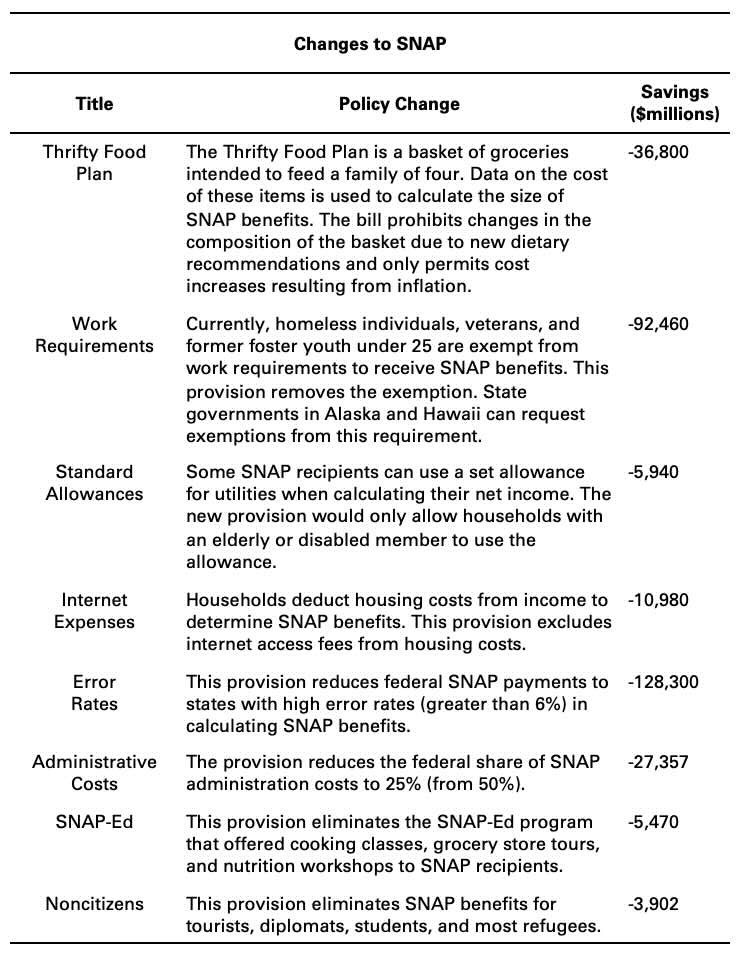What you need to know
The 2025 Budget Reconciliation Bill spans over 1000 pages. Buried in this legislation are thousands of changes in government policy. In this brief, we focus on just one part of the enacted bill: Title I on Agriculture, Subtitle A: Nutrition. This single subtitle includes 7 distinct sections, each affecting the Supplemental Nutrition Assistance Program (SNAP).
- The 2025 Budget Reconciliation Bill includes numerous changes to government policy and funding.
- We detail changes to the Supplemental Nutrition Assistance Program.
What is SNAP?
SNAP is a program funded by the federal government and administered by state governments that provides financial assistance to low-income families for food purchases. The amount of SNAP benefits varies depending on state residency, family size, total assets, and net income (income after deductions for housing costs, child care, and other expenses). In a SNAP family that qualifies for full benefits, the family receives approximately $180 per person per month on a debit card that can be used to purchase a wide range of groceries.
The total cost of the SNAP program in the 2024 Fiscal Year (ending September 30, 2024) was about $112 billion.
SNAP Policy Changes
Below is a breakdown of the changes to SNAP, along with the Congressional Budget Office’s (CBO) projected impact on federal spending (in $millions) between 2025 and 2034.

How will these changes affect SNAP?
The CBO estimates that the SNAP provisions will reduce federal spending by approximately $300 billion over the next decade, or about 10-15% of the total cost of SNAP over the same period. The CBO also estimates that the changes will reduce SNAP enrollment by approximately five million people per month. Currently, about 40 million people are enrolled in SNAP.
The Takeaway
Examining a narrow slice of the 2025 Reconciliation Bill reveals the detailed policy changes included in the Act.
The changes to the SNAP program are expected to reduce federal spending by over $300 billion over the next decade and decrease SNAP enrollment by approximately five million people per month.
Enjoying this content? Support our mission through financial support.
Further reading
Committee for a Responsible Federal Budget. (May 22, 2025). 2025 Reconciliation Tracker https://tinyurl.com/s6z5num
Swagel, P. (2025) Potential Effects on the Supplemental Nutrition Assistance Program of Reconciliation Recommendations, Congressional Budget Office, https://tinyurl.com/3ht6uf75, accessed 6/19/25.
Sources
House of Representatives. (2025). H.R.1 – One Big Beautiful Bill Act. https://tinyurl.com/3da4zeb3
CBO. (2025). Estimated Budgetary Effects Of A Bill To Provide For Reconciliation Pursuant to title II of H. Con. Res. 14, the One Big Beautiful Bill Act: As ordered reported by the House Committee on the Budget on May 18, 2025. https://tinyurl.com/52wud8cj
United States Department of Agriculture Food and Nutrition Service (2024) SNAP Work Requirements https://tinyurl.com/mt9hc93y
U.S. Department of Agriculture. (January 28, 2025). SNAP and the Thrifty Food Plan. Food and Nutrition Service. https://tinyurl.com/2sbjp5xk (Accessed 6/15/2025)
Food Research & Action Center. (2024). Heat and eat: New SNAP utility allowance rules. https://tinyurl.com/3hybu3jr (Accessed 6/15/202)
U.S. Department of Agriculture. (June 13, 2024). Matching funds requirement for State administrative expenses. Food and Nutrition Service. https://tinyurl.com/mud3a8mw (Accessed 6/15/2025)
U.S. Department of Agriculture. (August 23, 2024). SNAP quality control error tolerance threshold. Food and Nutrition Service. https://tinyurl.com/59njcd4s (Accessed 6/15/2025)
U.S. Department of Agriculture. (January 28, 2025). SNAP National Accuracy Clearinghouse (NAC). Food and Nutrition Service. https://tinyurl.com/48y8wxxf (Accessed 6/15/2025)
U.S. Department of Agriculture. (June 03, 2025). The Emergency Food Assistance Program (TEFAP). Food and Nutrition Service. https://tinyurl.com/2m8bhdth (Accessed 6/15/2025)
Contributors
Lindsey Cormack (Content Lead) is an Associate Professor of Political Science at Stevens Institute of Technology and the Director of the Diplomacy Lab. She received her PhD from New York University. Her research explores congressional communication, civic education, and electoral systems. Lindsey is the creator of DCInbox, a comprehensive digital archive of Congress-to-constituent e-newsletters, and the author of How to Raise a Citizen (And Why It’s Up to You to Do It) and Congress and U.S. Veterans: From the GI Bill to the VA Crisis. Her work has been featured in The New York Times, The Washington Post, Bloomberg Businessweek, Big Think, and more. With a drive for connecting academic insights to real-world challenges, she collaborates with schools, communities, and parent groups to enhance civic participation and understanding.
William Bianco (Research Director) is Professor of Political Science at Indiana University and Founding Director of the Indiana Political Analytics Workshop. He received his PhD from the University of Rochester. His teaching focuses on first-year students and the Introduction to American Government class, emphasizing quantitative literacy. He is the co-author of American Politics Today, an introductory textbook published by W. W. Norton, now in its 8th edition, and authored a second textbook, American Politics: Strategy and Choice. His research program is on American politics, including Trust: Representatives and Constituents and numerous articles. He was also the PI or Co-PI for seven National Science Foundation grants and a current grant from the Russell Sage Foundation on the sources of inequalities in federal COVID assistance programs. His op-eds have been published in The Washington Post, Indianapolis Star, Newsday, and other venues.









